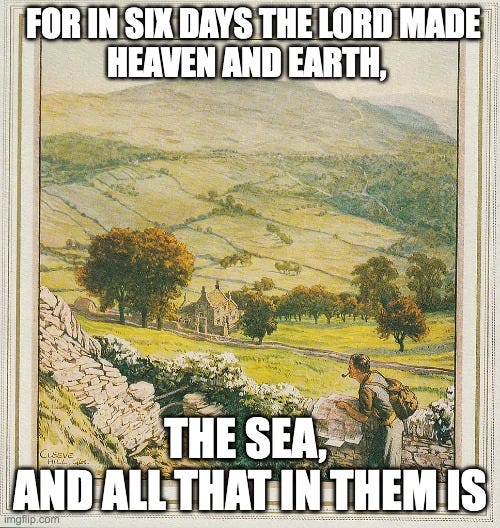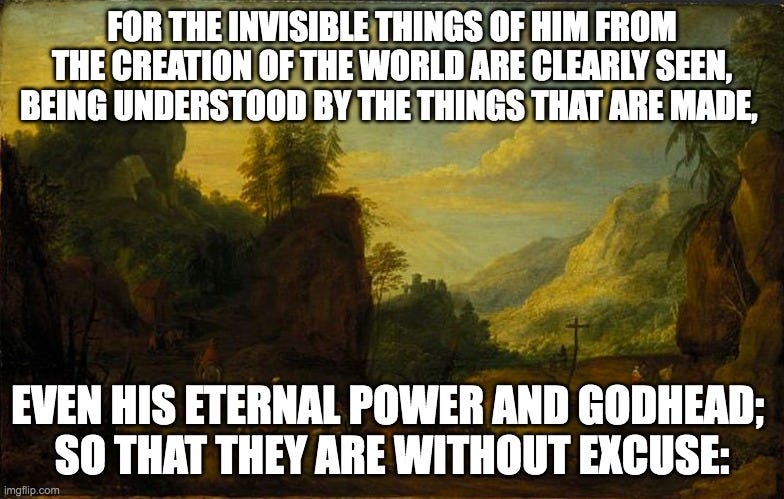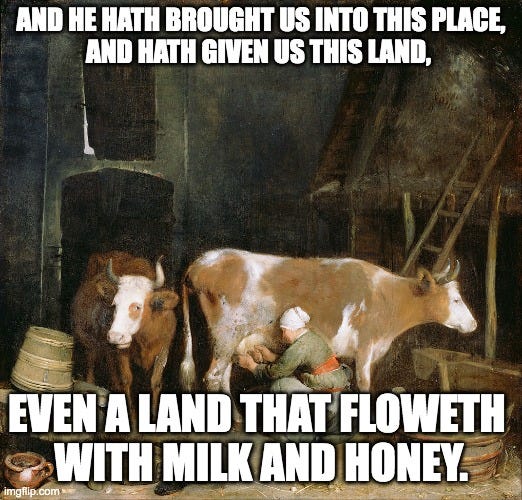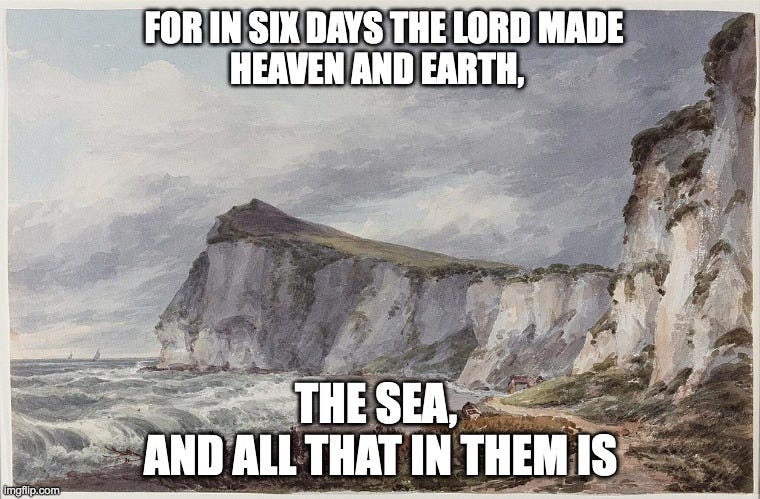How long ago was the Earth created? How long did that creation take?
In my first post I briefly touched on the meaning of the word ‘Yom’ in the creation account. The word translated ‘day’ in ‘And the evening and the morning were the first day.’ But that question deserves a much longer answer.
How Many Definitions?
When discussing the word ‘yom’, the Old Earth Creationists seem to indicate that it can mean ‘a long time’, or some such. Thus Tony Scialdone | GodWords gave, as possible definitions of ‘Yom’:
the daylight hours
the regular cycle of light and dark
an extended but finite period of time
a year
one’s lifetime
yesterday
today
tomorrow
a day’s work
a day’s journey
and more.
Whereas the Old Earth Creationist Krista Bontrager at Reasons to believe states:
The Hebrew word for “day” (yôm) has three literal definitions:
12 hours
24 hours
a long time period.
And the Strong’s Concordance gives the following list (derived from their ‘definition’ (I had to work on the format to help us see the list):
to be hot; a day (as
the warm hours), whether literally (
from sunrise to sunset,
or from one sunset to the next), or
figuratively (a space of time defined by an associated term), (often used adverbially): - age, + always, + chronicles,
continually (-ance),
daily, ([birth-], each, to)
day, (now a, two)
days (agone), + elder, X end, + evening, + (for) ever (-lasting, -more),
X full, life, as (so) long as (. . . live), (even) now, + old, + outlived, + perpetually, presently, + remaineth, X required,
season,
X since,
space,
then, (process of) time, + as at other times, + in trouble,
weather,
(as) when, (a, the, within a)
while (that),
X whole (+ age), (full) year (-ly), + younger.
The Obvious Meanings
Now, for the purposes of my study, I am going to ignore every time that the word ‘yom’ is used to mean anything ‘normal’. Not used as a metaphor or a general statement. Thus ‘today’, and ‘day vs night’, and ‘in three days’, and ‘sunset to sunset’… I’m not going to deal with any of those. Everyone agrees that they exist, and the debate between young Earth Creationists and Old Earth Creationists is not wether the Yom can mean sunset to sunset, or the part of the day when the sun is up, but what it means in the case of the first days.
The Pointed Meanings
The first thing I am going to point out (pun intended) is that some of the other meanings are pointed. That is to say they point to an instant, or a longer time, not to describe it, but to put something there. They include things like this:
Gen 2:17 But of the tree of the knowledge of good and evil, thou shalt not eat of it: for in the day that thou eatest thereof thou shalt surely die.
Now the problem with this is that it is very difficult to find one of these where the ‘day’ concerned must, of necessity, include lots of days. Day after day after day. For example:
Mal 4:3 And ye shall tread down the wicked; for they shall be ashes under the soles of your feet in the day that I shall do this, saith the LORD of hosts.
Could quite happen over several days. The treading might take years, months… or minutes.
A good knowledge of grammar, for example, will transform this:
Mic 7:11 In the day that thy walls are to be built, in that day shall the decree be far removed.
from ‘oh, it will take a lot of days to build the wall’ to ‘well, but there was a day before those days when the wall ‘was to be built’. There was a first day, a launch day, and ‘in the day that they walls are to be built’ could very logically refer to that day.
That Pesky Plural
Another way the word yom gets used is translated ‘days’. As in ‘in the days of’. And the problem with that is if it says ‘days’ well… a year is made up of a bunch of days. A thousand years is made up of a bunch of days.
So the word ‘yom’ is translated ‘age’ several times… but each time it literally means ‘how many days had this person lived.”.
Season/Space
Full confession, I didn’t search every single example, but when ‘yom’ is translated ‘season’, it starts in the plural. Similarly when it is translated ‘space’:
Gen 29:14 And Laban said to him, Surely thou art my bone and my flesh. And he abode with him the space of a month.
The problem of metaphor
So something can literally have a definition of one thing, say, ‘snow’… and yet can have a metaphoric use of ‘very white’. Which metaphors again into ‘sinless’.
Which does not mean that the word ‘snow’ means ‘sinless’. It means that the very white thing, snow, is being used as a metaphor for ‘being without sin’.
Now it could be that what the OEC people are saying is that the world ‘yom’ does not ‘mean’ ‘a long period of time’, but it ‘means’ a day, and is ‘being used’ as a metaphor for ‘a long period of time’. In which case they should say so.
Specific Cases
This place the Hebrew writers pervert, for they think that they are yet to be redeemed by the coming of the Messiah; and they imagine that this will be the third day: for God once drew them out of Egypt, this was their first life; then, secondly, he restored them to life when he brought them back from the Babylonish captivity; and when God shall, by the hand of the Messiah, gather them from their dispersion, this, they say, will be the third resurrection. But these are frivolous notions. Not withstanding, this place is usually referred to Christ, as declaring, that God would, after two days, and on the third, raise up his Church; for Christ, we know, did not rise privately for himself, but for his members, inasmuch as he is the first-fruits of them who shall rise. This sense does not seem then unsuitable, that is, that the Prophet here encourages the faithful to entertain hope of salvation, because God would raise up his only-begotten Son, whose resurrection would be the common life of the whole Church.
John Calvin (Note: he did not consider this the best interpretation, but he did recognize it!)
The website ‘Science and Faith - Old-Earth Creationism’ gives two examples of the word ‘yom’ being used to mean ‘an age’, or a long indeterminate time. They are:
* Hosea 6:2,
Hos 6:2 After two days will he revive us: in the third day he will raise us up, and we shall live in his sight.
He will revive us after two days; He will raise us up on the third day. This refers to Israel’s ultimate restoration hundreds or thousands of years in the future.
* Zechariah 14:7,Zec 14:7 But it shall be one day which shall be known to the LORD, not day, nor night: but it shall come to pass, that at evening time it shall be light.
describing the Day of the Lord, contains yôm echad (translated “unique day”), which is identical to yôm echad of Genesis 1:5 (translated “one day”). The context of Zechariah 14:7-8 suggests yôm echad will be a period of time spanning at least one summer and one winter, obviously longer than a 24-hour calendar day.
Direct Quotes from their website, passages added.
Can we assume that these are there two best examples? Surely it would make no sense to say, “We have lots of great examples, let’s put down our two worst examples.” Cause these are bad examples.
Taking the second one first, it has several distinct problems. The first is that there is a bit of circular reasoning. The idea that the Lord might know ‘one day’ (see ‘pointed meaning’, above) that is at a particular point in a long process is eminently reasonable. We ourselves might well say, “The instant I knew she was to be my wife,” “The hour I knew she was to be my wife” and “The day I knew she was to be my wife,” all referring to the exact same thing. It would be stupid to say, “What, you realised it over the course of a day? Surely there was a particular second where…”
Its second problem is that it is obviously a metaphor, since the passage itself says ‘not day, nor night’..
Which is a third problem, cause the use of ‘yom’ in Genesis one is of a very specific form: “And the evening and the morning were the first day.” And this ain’t that.
But turning to the first example, one can but stare in amazement. Did the authors of the website not recognise the time frame ‘third day’? I mean, the words ‘raise us up’ are right there. And you can hardly open a commentator that doesn’t make the point… that the restoration of Israel will be in parallel to the resurrection of Christ! That the Gentiles and the Church were, spiritually speaking, raised the third day?
Even if there is a metaphoric use in this passage: perhaps the time of the Jews (Old Testament and until Paul), and a time of the Gentiles (See Romans 9-11); after which comes a time of their joining and uniting with Christ (see Romans 11), one cannot just throw away that that is a metaphor coming from a very literal use of the idea of ‘three days’. Like, days days.
Conclusion
I am not an Old Earth Creationist. My first reason is that there is no reason to be. There is no compelling evidence that God used thousands of years to produce the six days of creation.
However my second reason is that it is linguistically highly improbable. I have never seen, nor been shown, the use of the word ‘yom’ in any of the rest of Scripture in a way that would be similar to the use they propose for it in Genesis 1. Even the uses of the word ‘yom’ in singular that may mean ‘a long time’ (of which I have found none that were definitive), we do not need to change the definition of ‘flowing’ (or, KJV, ‘floweth’) to understand that there were not rivers, or even creeks of milk in Palestine. There were no ponds of honey.
I look forward to anyone that wishes to respond to this post put any examples forth, however. Indeed I would love it if anyone would find examples of the use of the word ‘yom’ to mean several of the things that he defines it as.
Thank you for reading Von’s Substack. I would love it if you commented! I love hearing from readers, especially critical comments. I would love to start more letter exchanges, so if there’s a subject you’re interested in, get writing and tag me!
Being ‘restacked’ and mentioned in ‘notes’ is very important for lesser-known stacks so… feel free! I’m semi-retired and write as a ministry (and for fun) so you don’t need to feel guilty you aren’t paying for anything, but if you enjoy my writing (even if you dramatically disagree with it), then restack, please! Or mention me in one of your own posts.
If I don’t write you back it is almost certain that I didn’t see it, so please feel free to comment and link to your post. Or if you just think I would be interested in your post!
If you get lost, check out my ‘Table of Contents’ which I try to keep up to date.
Thanks again, God Bless, Soli Deo gloria,
Von
Hath God Said?
Exo 31:17 It is a sign between me and the children of Israel for ever: for in six days the LORD made heaven and earth, and on the seventh day he rested, and was refreshed.






